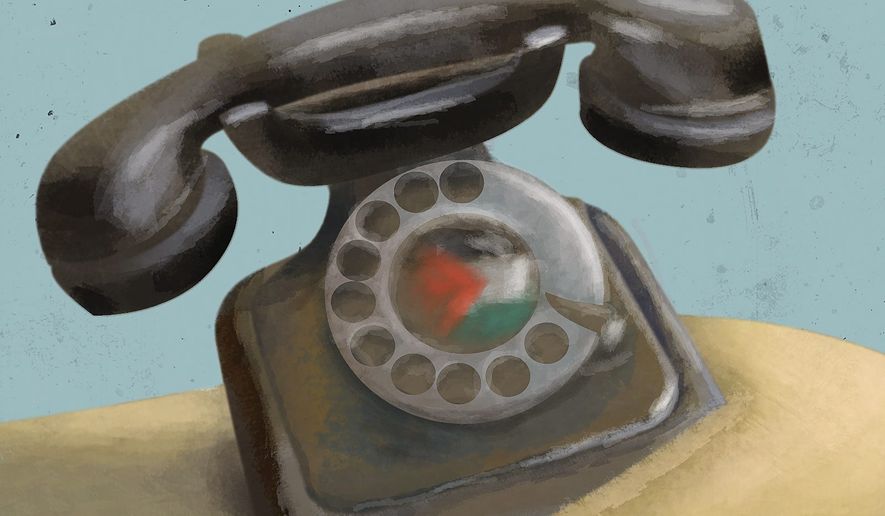OPINION:
Technology moves so quickly that the laptop or cellphone you bought in January will probably be obsolete by September. Politics causes obsolesce more slowly, especially in the Middle East where religion is the foundation of politics and tends to prolong the process.
A political movement can be made obsolete by its own mistakes, by being overtaken by more important political events or — as in the case of the Palestinians — a combination of both. It has taken more than six decades to reach this point, but because of the threat Iran poses to the Arab states, and the Palestinians’ rejection of one reasonable peace deal after another, the Palestinian movement has become as obsolete as Windows 95.
The Palestinians, as the late Israeli diplomat Abba Eban said, never miss the opportunity to miss an opportunity. The 1993 Oslo Accords were an excellent chance to achieve peace between them and the Israelis. The two sides agreed to recognize the legitimacy of each other, Israel agreed to swap land for peace, and the Palestine Liberation Organization agreed to renounce terrorism. The Oslo peace lasted very briefly because the Palestinians quickly reverted to terrorism.
Beginning in 2000, three Israeli prime ministers tried to implement the “land for peace” theory. In 2000, Ehud Barak agreed to a plan proposed by President Clinton that would have established a Palestinian state in the West Bank and the Gaza Strip. Palestinian Authority President Yasser Arafat walked out of the negotiations and launched his “Second Intifada” terror campaign.
In 2005, Ariel Sharon dismantled all Jewish settlements in Gaza and pulled Israel back to the borders it had before the 1967 war in an attempt at peace with the Palestinians. Within two years, rains of missiles from Gaza became the norm while the terrorist group Hamas was elected to rule the Gaza Strip.
In 2008, Ehud Olmert presented Palestinian President Mahmoud Abbas with a detailed map of a proposed Palestinian state composed of almost all of the West Bank area and all of the Gaza Strip, including a divided Jerusalem as the capital of both nations. Mr. Olmert’s offer was conditioned on the Palestinians conceding the supposed “right of return” which would, if implemented, turn Israel into a Palestinian-majority state. Mr. Abbas left with the map and never returned to the negotiations.
During those years, Iran has become the most significant threat the Arab states face. Jewish Israel — which only wages defensive wars against them — is far less of a threat to the Sunni Arab states such as Saudi Arabia, Bahrain and the United Arab Emirates than Shiite Iran.
President Trump has offered yet another peace deal between Israel and the Palestinians. It freezes further Israeli settlement of the West Bank but also favors Israel in several important respects, including giving Israel security control over the Palestinian connections between the West Bank and the Gaza Strip. In exchange for a contiguous Palestinian state in Gaza and much of the West Bank, the deal requires the Palestinians to renounce terror and halt the activities of the Hamas and Islamic Jihad terror networks. If the Palestinians satisfy those criteria over a four-year period, a new Palestinian State — with its capital on the eastern side of Jerusalem — would be formed and recognized by the United States.
The Palestinians, as they have since 1993, overplayed their hand. Mr. Abbas rejected the deal outright, calling it the result of a “conspiracy” and said the Palestinians’ right to the entirety of Jerusalem was “not for sale.” On cue, there was another “day of rage” comprised of Palestinian demonstrations in the West Bank and Gaza Strip. Mr. Abbas reportedly refuses to take Mr. Trump’s calls. He apparently believes, correctly, that peace will end the Palestinians’ cause.
The most interesting aspect of the deal is not in its details, but in the Arab states’ reactions to it. The UAE, Oman and Bahrain all sent their ambassadors to the White House announcement of the plan, clearly indicating their support for it. Both the UAE and Saudi Arabia have urged the Palestinians to accept the deal as the basis for further negotiations.
The only reason for the Arab states to do so is Iran. It is politically expedient for the Arab states to throw the Palestinians under the geopolitical bus, favoring increasingly open alliances with Israel over the Palestinians’ unreasonable recalcitrance. This doesn’t mean that the Arab states will be Israel’s faithful allies. It only means that the Arab states believe — for now — that Israel and its American ally are their best shields against Iran.
It is no coincidence that more than 23 nations, including much of Europe, South America, Japan, Australia and seven Middle Eastern nations, support Mr. Trump’s deal. It’s also no coincidence that Iran and the Palestinians oppose it.
Though greatly diminished as a political force, the Palestinians won’t disappear. They will continue to be funded by the Arabs and several European states. Their seat in the United Nations, granted on the pretense that the Palestinians are a nation, will help maintain their shrinking role.
The Palestinians apparently never learned Lord Palmerston’s rule that nations have neither permanent allies nor permanent enemies, only permanent interests. That failure, and Iran’s aggression, has made them obsolete.
• Jed Babbin, a deputy undersecretary of Defense in the George H.W. Bush administration, is the author of “In the Words of Our Enemies.”




Please read our comment policy before commenting.